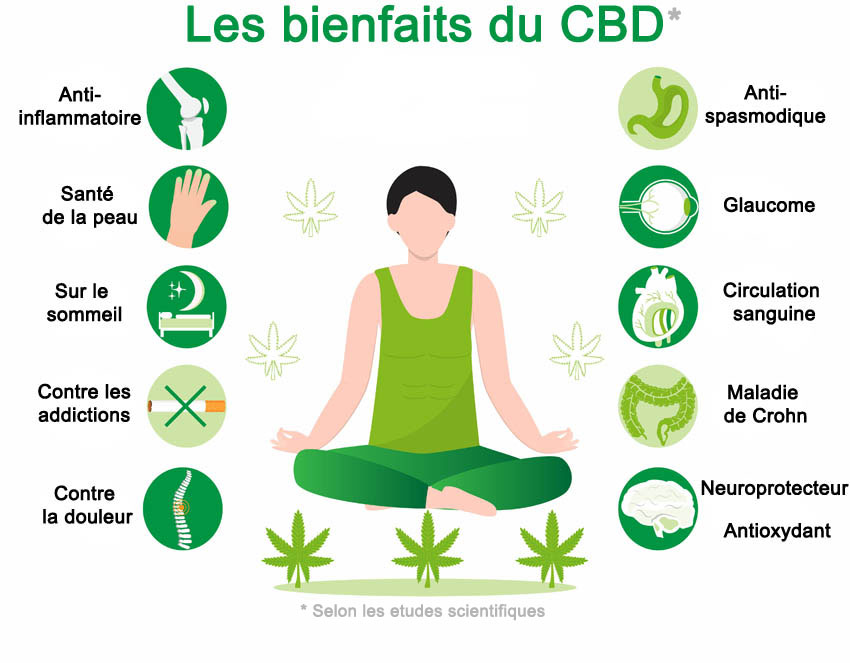Have a question? 06 70 73 89 02
🔞 Not for sale to under 18s
⏱️ 48-HOUR FLASH SALE: 20% off EVERYTHING on the site with the code FLASH 💥 ( excluding accessories and gummies)
Have a question? 06 70 73 89 02

Cannabidiol, or CBD for short, is one of the many molecules found in the hemp plant. It is estimated to contain over 200 other molecules, but CBD is the cannabinoid most present in the hemp flower.
Man's use of hemp goes back a long way. The first traces date back almost 10,000 years. As early as 1800 B.C., several ancient Egyptian texts spoke of the "medical plant marijuana" in reference to its THC-containing sister plant, cannabis. The difference between hemp and cannabis is the THC content.
Above 0.3% THC in the plant, it's cannabis and illegal. Below 0.3% THC, it's hemp. It's legal and has no psychotropic effects. Better still, according to certain clinical studies, CBD has therapeutic potential and benefits! We present them to you in this article.
According to a 2019 study from the University of Białystok, Poland[1]: " CBD may indirectly enhance anti-inflammatory effects. Clinical studies have confirmed that CBD reduces inflammatory cytokine levels. Acting in this way via the PPAR* protein receptor, CBD exhibits anti-inflammatory and antioxidant properties."
**PPAR: They play an important role in fatty acid metabolism, inflammation and embryonic development.
Rheumatoid arthritis (more commonly known as arthritis) is a chronic inflammatory disease that affects around 1% of the population and manifests itself as joint destruction, deformity and loss of function associated with joint stiffness, pain, swelling and tenderness.
In a 2010 study[2], daily oral administration (5 mg/kg) of CBD was shown to inhibit disease progression.
According to this 2010 study: "One of the best-studied uses of CBD is its therapeutic effect in diabetes. CBD has been shown to have a therapeutic effect in diabetic neuropathy[2]." Another 2010 study adds that " CBD attenuates glucose-induced endothelial cell inflammatory response and barrier disruption in human coronary endothelial cells[3]."
The second study from 2010 claims that CBD has powerful anti-inflammatory actions. It has been shown to reduce inflammatory cytokines in arthritis and diabetes. In so doing, it prevents brain damage during blood circulation failure and prevents cerebral infarction[3].
According to the conclusion of a 2020 study[4]: CBD presents an opportunity for the treatment of intractable chronic pain for which primary treatments are insufficient or impossible.
The 2020 study[4] found that "prolonged treatment (less than 7 days) with CBD attenuated chronic pain caused by chronic constriction injury of the sciatic nerve in rats and mice."
In a 2019 study[5], it was found "In patients with fibromyalgia, CBD treatment reduced pain by more than 30% compared to subjects given a placebo."
In 2017, a study[6] was able to demonstrate the positive impact of CBD on the treatment of migraine. The study compared the effect of different substances given to test groups. It showed that the cannabinoid solution produced the best results. "In the treatment of acute pain, cannabinoids reduced pain intensity in migraine patients by 43.5%.

A Brazilian study published in 2019, conducted a test: 57 subjects were given either oral CBD, or a placebo 90 minutes before facing a simulated public speaking test. The researchers found that a 300 mg dose of CBD was effective in significantly reducing anxiety during this test[7]. Also in 2019, a study looked at CBD's interaction with anxiety and sleep[8]. Among 72 patients with anxiety disorders, 52 individuals responded favorably after one month of taking CBD, noting a reduction in their disorder.
In a 2016 study by researchers at the University of Colorado[9], it was reported that CBD in relatively large doses (25mg per day, in this case) has an antidepressant effect. In this clinical trial, CBD in oil form was substituted for a well-known antidepressant: imipramine (LAROXYL), and no side effects were observed with cannabidiol.
A tumor is a mass of abnormal cells that reproduce uncontrollably and invade the organ. In 2011, a study[10] found that CBD induced apoptosis (programmed cell death) in a series of human breast cancers. A 2016 clinical study[11] by the University of Madrid claims that "CBD exerts a significant anticancer effect - and in particular it inhibits the invasive power of metastasis " [...] "cannabinoids (mainly CBD and THC) inhibit tumor angiogenesis and decrease cancer cell migration." Cannabinoids only affect cancer cells.
A 2018 joint study by the University of Naples and Aberdeen[12] states that: CBD reduces cell proliferation only in tumor cells, but not in healthy cells.
To find out more: our article on the effects of CBD on cancer cells.
A neurodegenerative disease is a progressive pathology affecting the brain or, more generally, the nervous system. Many neurodegenerative disorders , such as Huntington's disease, Parkinson's or Alzheimer's , involve cognitive deficits. A 2012 study[13] investigated whether cannabidiol could be useful in the treatment of memory disorders.
An animal model of cognitive impairment caused by iron overload was used to clinically test the effects of cannabidiol in mice suffering from memory impairment. Results: A single injection of cannabidiol at the highest dose restored memory in iron-treated mice . Cannabidiol taken regularly improved recognition memory in iron-treated mice. High-dose CBD did not affect memory in control mice.
Also, in a 2017 study[14] on the effects of CBD on Alzheimer's disease, CBD's ability to reduce neuronal inflammation and promote neurogenesis* was observed in tests on mice. According to the study, CBD prevents the development of cognitive deficits in mice. The study concludes that "cannabidiol has neuroprotective, anti-inflammatory and antioxidant properties. "
A 2008 study[15] from the University of Naples presents "Cannabidiol as a potentially good means of normalizing motility* in patients with inflammatory bowel disease (Crohn's disease and ulcerative colitis).
** Motility can be either hyperactive, leading to diarrhea or vomiting, or underactive (hypo motility), leading to constipation or vomiting.
*In both cases, abdominal pain is observed.
Epileptic spasms are characterized by sudden extension or flexion of the limbs. In a 2018 clinical study[16]: 57 patients aged 1 to 20 with epilepsy of various etiologies were treated with CBD oil (CBD / THC ratio of 20:1) for at least 3 months (median follow-up time - 18 months). 46 patients were included in the efficacy analysis.
The average dose of CBD was 11.4 mg / kg / d. 26 patients. It was observed that 56% of people had a reduction ≤ 50% in mean monthly seizure frequency. The results of the study suggest that adding CBD on top of conventional treatment for patients with refractory epilepsy can result in a significant reduction in seizure frequency.
Acne is an inflammatory skin disease, particularly prevalent in adolescence. Acne and seborrhea, the most common dermatological diseases, are characterized by very high lipid (sebum) production by the sebaceous glands. Clinical results published in 2014[17], suggest that due to its combined lipostatic*, antiproliferative and anti-inflammatory effects, CBD has potential as a promising therapeutic agent for the treatment of acne.
** Lipostatics = which control the constancy of fat reserves.
Psoriasis is another inflammatory skin disease. It is autoimmune in origin, with inflammation resulting from a poor immune system response. A 2017 study by the University of Colorado[18] found that CBD's immunomodulatory properties reduced skin inflammation.
A study[19] of 20 patients with the two most common skin disorders: psoriasis (n: 5 patients), eczema (n: 5) and the resulting scars (n: 10). The subjects applied an ointment containing CBD to the affected skin areas twice a day for three months of treatment. Results showed a marked improvement in skin appearance, particularly in elasticity and hydration.
Addiction-related disorders include alcoholism, drug addiction, smoking and behavioral addictions (e.g. gambling, Internet). They act on the brain's reward circuit. The object of the addiction takes up more and more space in his or her life. He progressively increases the dose/use to achieve the same effect.
Addictive disorders persist for multiple reasons: craving, anxiety, the subject's sensitivity to stress. In a study published in 2018[20]: mice with a history of alcohol or cocaine self-administration were given transdermal CBD at 24-hour intervals for 7 days. Their stress levels and anxiety were then assessed.
CBD has been shown to reduce stress and the need to use addictive substances. A 2015 Quebec meta-study[21] points out that studies on mice have shown possible effects of CBD on addiction to opioids* and psychostimulants*. Studies on humans, meanwhile, have presented preliminary evidence of a beneficial impact of CBD on cannabis and tobacco.
** Psychostimulants: cocaine, ecstasy, MDMA, etc.
** Opioids: derivatives of opium. Examples: heroin, morphine and codeine.

Stress is a major factor in loss of libido. Numerous studies have shown that CBD has anxiolytic properties[22]. Cannabidiol can therefore improve sex life by acting favorably on this lever.
In a study of 5398 Americans, 9% of whom reported using CBD before having sex, 31% of men and 33% of women experienced improved orgasm[23].
According to this study[24], cannabidiol applied topically has an anti-inflammatory effect. Some lubricant manufacturers have also decided to incorporate CBD into their products.
As men age, they produce dioxin, a toxin that plays an important role in erectile dysfunction. According to a recent study[25], CBD reduces this toxin in the body.
Research into CBD is well underway, and its applications seem almost limitless. Nevertheless, we'll have to wait many years before we can unlock all the secrets this wonderful plant has to offer. If this article has inspired you to take the plunge, don't hesitate to visit our store. Check out our blog to learn more about CBD and keep up to date with the latest news!